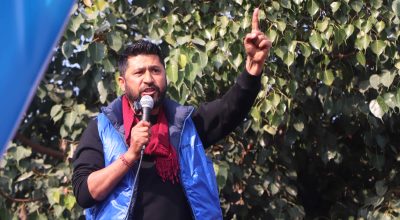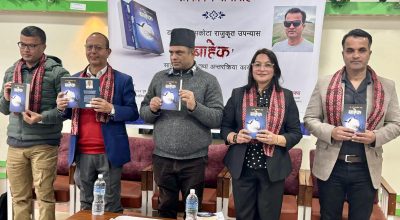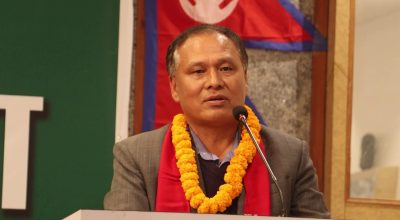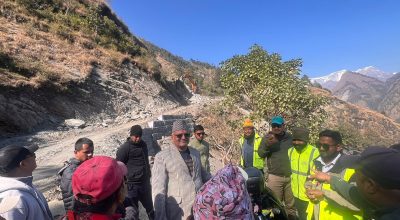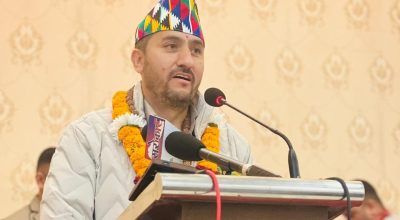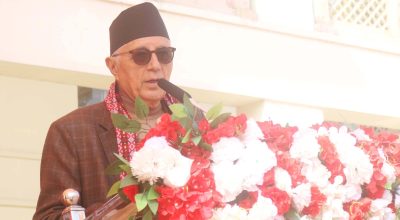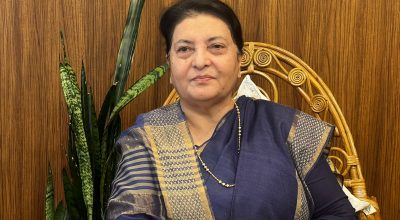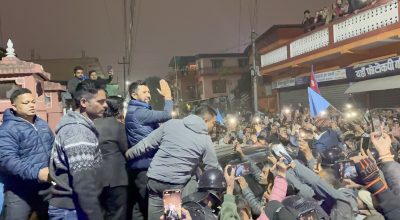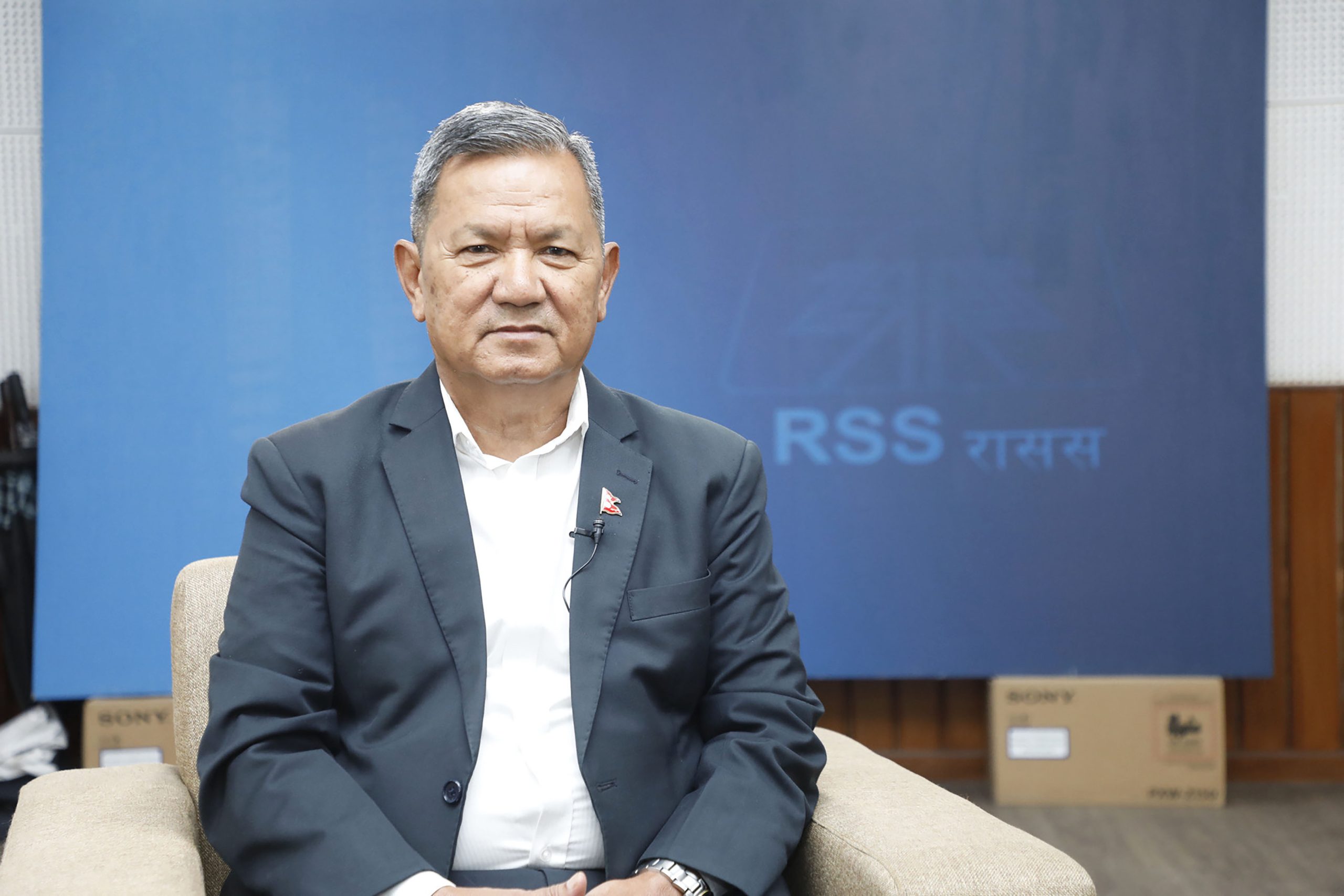
Kathmandu, Oct 21: Minister for Communications and Information Technology, Prithvi Subba Gurung, has announced that the Ministry has successfully achieved its targets in the first 100 days since the present government was installed.
Key accomplishments include the installation of fiber optic infrastructure in Simikot, Humla, and the establishment of the Government Integrated Office Management System (GIOMS).
During this period, the coverage of 4G-FTA mobile service has increased by two percent, benefiting around 600,000 citizens. Currently, 97.2 percent of the population has access to mobile phone services. The optical fiber network has expanded to 16,000 kilometers, with fixed broadband service accessibility at 44.36 percent, and the use of 4G/LTE networks has risen to 72 percent.
In an interview with RSS, Minister Gurung said that despite being new to the ministry, he has recognized a shift towards systematizing the communications sector, particularly in addressing information technology challenges. He reported that all 15 goals set for the ministry in the first 100 days have been fulfilled.
Significant developments include the extension of the Rastriya Samachar Samiti (RSS) service from 17 to 24 hours and the launch of news bulletins in Newari and Maithili languages.
The Gorkhapatra Corporation has introduced a language page in Ranatharu, increasing its language pages to 44. Additionally, the contents of Gorkhapatra in the last eight years have been digitized in this period, and Radio Nepal has digitalized 14,033 old audio tapes while launching news broadcasts in the Danuwar language.
Nepal Television has also expanded its offerings by adding a news bulletin in Nepal Bhasha, bringing its total to seven languages.
Minister Gurung stressed that good governance begins with clear policies and that existing regulations need urgent updates. He assessed that many existing policies are outdated, with only minor amendments made to the Information Technology Act, the Press Council Act, and the Telecommunications Act.
The ministry is focusing on advancing good governance through policy revisions, starting with the endorsement of the Public Service Broadcasting Act to integrate Nepal Television and Radio Nepal, he added.
When a draft regulation for social media has been submitted to the Council of Ministers, Minister Gurung is hopeful of its swift passage.
He expressed the government’s commitment to promoting an independent and responsible journalism sector through the preparation of the Mass Communications Bill, along with amendments to the Telecommunications Act and updates to the Film Act.
The Ministry expects to present 9-10 bills to the Council of Ministers soon, according to the Minister.
Talking about the implementation of the Public Service Broadcasting Act which has been recently enacted by the parliament, Communication and Information Technology Minister said that this Act is already published in the Nepal Gazette and has reached the implementation phase. Related regulations would be formulated on the basis of the Act.
According to him, the Ministry will now go for the process of appointing the PSB Executive Director. Nepal Television and Radio Nepal would be taken ahead in a systematic way by forming the PSB Board of Directors in an integrated way. Adoption of the PSV model, the Minister believed, would make the two broadcast media more competitive.
On systematizing social sites
On the question how the Ministry was thinking of making the social sites systematized, the Communication Minister stated that everything has a limit and democracy too had its limit. Similarly, our constitution has its own limitations. By the same token, the rights and freedom that every individual is seeking have limits. Every citizen has to abide by the Constitution, the prevalent Acts and laws while exercising one’s rights.
“It is said that the social sites are becoming unruly at present. It seems like anyone can say and write anything one likes or spit venom against others in the social media. This is not democracy. The alternative to democracy and the republic is even better democracy and republic. Unruliness can never be the alternative to democracy,” he said, stressing on the need of regulating the unbridled anarchy that is seen in the social media.
Minister Gurung underscored on systematizing the users, the operators and the registration process of social media platforms. Ending the anarchy in the social media falls under the social regulation. All should follow the law and freedom should not be understood as being anarchy. The government moves ahead in accordance with the principle that the criticism should be healthy, dignified and within the limits permitted by the system.
On the topic of the nation taking maximum benefit from the information technology, Minister Gurung said the contribution of the digital economy should be increased to three percent of the GDP. The GDP of Nepal is around Rs 6000 billion. Three percent of this amount is about 200 billion which is the expected contribution from the information technology sector.
In thus connection, he said the use of information technology should be explored and promoted in every sector- be that in agriculture, industry, trade, tourism, education and health.
“We are talking of building smart cities, which means the cities should be technology-friendly. The topic of technology lieracy should also be incorporated in education. We have mentioned eight sectors in the Digital Nepal Framework, but more than 10 topics should be incorporated in it. The government has the plan of complete digitization at all the 753 local levels for achieving the goal of ‘digital Nepal’,” he added.
According to the Minister, the plan is to make all the government ministries and the bodies, commissions and various corporations under them completely digitalized.
He said that the government has initiated to complete the remaining tasks of the peace process and ensure payments to the dairy farmers. The work of enacting laws related to cooperatives is also going to be passed soon. Similarly, the government has made arrangements for immediate rescue and relief to the people affected by floods, landslides and inundation.
The roads affected by floods, landslides and inundation have been brought into operation after repair. Water, electricity and telephone problems caused by floods and landslides have also been resolved.
It is estimated that property and infrastructure worth more than 17 billion rupees have been damaged due to the recent floods and landslides across the country. The government has started reconstruction and rehabilitation of the destroyed structures and has taken decisions keeping the victims in the centre. There is still a lot of work to be done in the field of corruption control and good governance.
We have a plan to reach internet services to each corner of the country. There is a plan to develop Nepal as the ‘IT hub’ of the world and it is also possible too.
Prime Minister KP Sharma Oli clearly mentioned Nepal’s Foreign policy and neighborhood policy in the United Nations General Assembly which has further opened the door to extend foreign relations in different levels. Mainly for political stability within the country, the two main political parties, Nepali Congress and CPN (UML) have formed a government together.
Minister Gurung also claimed that the government’s 100 day’s performance has created positive and optimistic vibes among the people and they will gradually experience it into action. #nepal #RSS #communication





